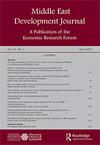Remittances and disaggregated country risk ratings in Tunisia: an ARDL approach
IF 0.9
Q4 DEVELOPMENT STUDIES
引用次数: 1
Abstract
ABSTRACT Tunisia is currently facing political, economic and financial problems which have an impact on the flow of remittances. This study is the first attempt to give a thorough analysis of a two-way relationship between workers’ remittances and ICRG disaggregated country risk ratings (such as economic, financial and political risks) in Tunisia in short and long run, spanning the period 1984–2016. In an attempt to achieve this key objective, an ARDL approach combined with CUSUM and CUSUMSQ tests, and Wald test are adopted to investigate this linkage. The results show the presence of a long-run relationship. In addition, it could be deduced that in the long-run, economic risks have a negative impact on remittances, whereas in the short-run, they have a positive impact. The financial risk increases remittances because it includes variables related to remittances such as exchange rate stability. A higher level of remittances carries a higher level of financial risk in the short and long-runs. These results engage policy-makers to minimize this negative effect and channel remittances towards investment purposes. Results also indicate that, in response to an increase in remittances, the political risk decreases in the short run but increases in the long run.突尼斯的汇款和分类国家风险评级:ARDL方法
突尼斯目前正面临着政治、经济和金融问题,这些问题对汇款流动产生了影响。本研究首次尝试全面分析1984-2016年期间突尼斯工人汇款与红十字国际委员会分类的短期和长期国家风险评级(如经济、金融和政治风险)之间的双向关系。为了实现这一关键目标,采用ARDL方法结合CUSUM和CUSUMSQ测试以及Wald测试来研究这种联系。结果显示存在一种长期的关系。此外,可以推断,从长期来看,经济风险对汇款有负面影响,而从短期来看,经济风险对汇款有积极影响。金融风险增加了汇款,因为它包括与汇款有关的变量,如汇率稳定。从短期和长期来看,较高的汇款水平带来较高的金融风险。这些结果促使政策制定者尽量减少这种负面影响,并将汇款用于投资目的。结果还表明,随着汇款的增加,政治风险在短期内会降低,但在长期内会增加。
本文章由计算机程序翻译,如有差异,请以英文原文为准。
求助全文
约1分钟内获得全文
求助全文

 求助内容:
求助内容: 应助结果提醒方式:
应助结果提醒方式:


